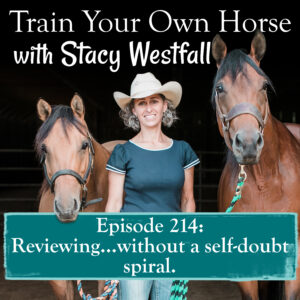Episode 214: Reviewing…without a self doubt spiral.

Self-doubt is often born out of a low-value cycle.
“I could have done better.” sound so innocent.
But what it really begins a little spiral of self-doubt.
The next time you have to make a decision, a part of you will feel doubt, because you KNOW you’ll be judging yourself in the future.
Your treatment of yourself during a review, greatly impacts your willingness to participate.
It is possible to look at your past actions and learn from them without judging yourself for making the choice. It is possible to stay neutral about the choice, feel disappointment about the result, AND learn from the experiences.
On your horsemanship journey, you will experience many emotions.
You will likely make choices that you won’t want to repeat.
Changing your behavior is possible without adding shame or criticism.
Make the decision.
Have your own back.
Accept it as done and complete.
AND realize you are still free to choose differently.
“Life can only be understood backwards; but it must be lived forwards.”
Soren Kierkegaard
SUBSCRIBE TO THE PODCAST HERE:





YOURS FREE
WHY IS MY HORSE...?

